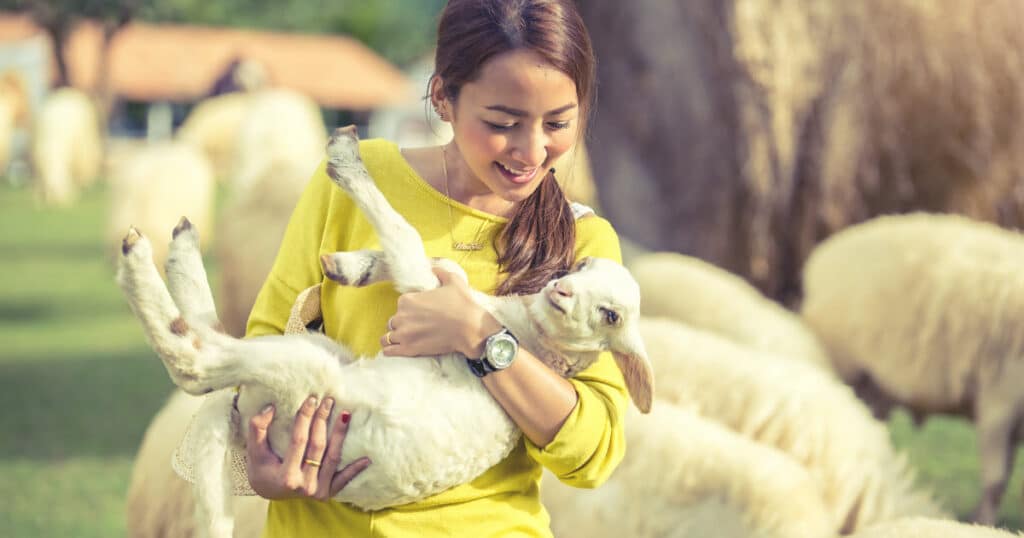If you’ve never owned sheep before, budgeting for and buying a sheep can be a little overwhelming. Are you buying a market lamb for a child’s 4H project or investing in brood ewes to start a flock for a brand new sheep farm? Are you hoping to raise sheep for profit or as a pet? And how do you know if you’re getting a good deal or being taken to the cleaners? In short, how much do sheep cost, and how do you know if you’re paying a fair price?
Let’s take a look at the costs of buying different types of sheep, places to buy sheep (for example, privately, at auction, or at a show or sale). In this article I’ll also share information you should try to learn before you buy a sheep, and potential issues to look out for and avoid when purchasing sheep.
Let’s get right into it.
The Cost of Sheep, Explained
If you want to buy a starter flock, make sure you buy the animals from a reputable breeder who has used practices with raising the sheep that mirror the way you want to continue with the process. In my experience, the usual price for a purebred and registered adult ewe will range from around $300 to $400.
It the ewe is going to have lambs in the following few weeks or a month, you can expect to pay something on the high end of that range – closer to $400.
When it comes to rams, you can expect to pay between $400 and $500 for a solid stud ram – not the best of the best, but a structurally sound ram of decent size and appearance that comes from good stock.
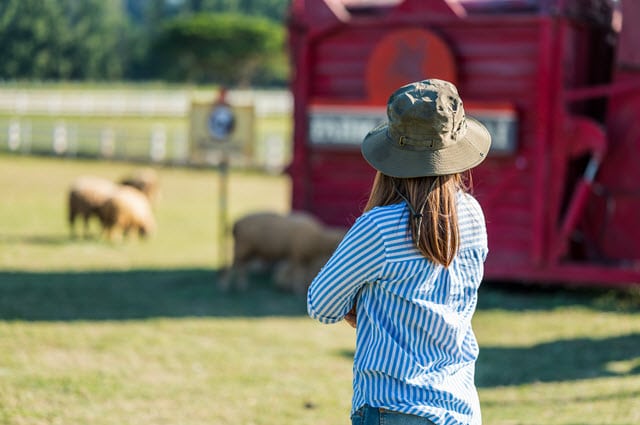
When deciding which breed to buy, it’s best to consider your own property, needs and preferences. Do research into the qualities of each breed and what you will need to do to raise them and keep them properly on your farm.
You should also think about your purpose for getting sheep. Are you getting them as pets or for a hobby farm, or are you going to use them to generate an income (in which case you may want to start with a business plan for your sheep farm)?
The Costs of Not Doing Your Homework
If you rush into a purchase, or purchase a sheep from someone without a strong reputation, you may be throwing your money away.
I can remember that one of the first brood ewes I purchased as the foundation for my flock was an older ewe and the breeder knew that she had a history of mastitis (meaning she wouldn’t be able to produce the milk needed to raise lambs). This was information that was not shared with me, but because he could sell her for $350 to me instead of culling her for meat, he took the opportunity to do so.
One of the other foundation ewes I purchased was from a reputable breeder and she produced two lambs every year for me for the next 8 years. She lambed easily without assistance every year, was an excellent mother, and was the foundation for my brood ewe flock, with many of her daughters going on to deliver some of my best show lambs.
If you’re purchasing breeding stock, it takes time to select not just for appearance, but about the qualities that you want in your ewe flock. You can always breed in the size and features you want to see in your lambs by selecting a complimentary stud ram.
A Local Farm is the Best Place to Buy Sheep
Check out local farms to find a shepherd who is raising sheep there in the same way you want to once you get them to your own property. This is by far the best route to take when finding and purchasing sheep.
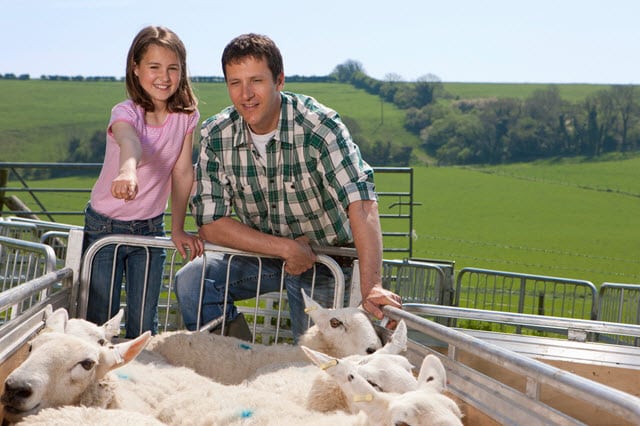
One reason why this is so effective is the fact that the sheep will already be used to the conditions of your region. They will have shown that they are able to thrive in your area, and deal with similar circumstances to what they’ll encounter on your property.
What’s more, if you have questions or need help in the early going – the breeder is nearby to assist you. This could come in the form of advice over the phone, or a trip to your farm. Regardless of the cost of your sheep, this resource is invaluable to new shepherds.
Local breeders are incentivized to treat you well. Their reputation is at stake, and they will see you as a repeat customer (meaning it’s good business for them to treat you fairly).
Getting sheep from a non-local source is a big risk. If the sheep you purchase have trouble adapting to their new conditions, you could have problems getting your flock to thrive. It is possible that you will end up having to cull some animals that don’t do well on your farm.
The Approach We Took on my Farm
On my farm, I bought sheep that would become the foundation of my Hampshire ewe flock from local farms in New England. Once we had a good ewe flock that lambed easily and produced quality stock, we introduced new bloodlines by investing in high quality rams from the Midwest to gradually improve the flock.
We took a similar approach with our Romneys … purchasing our foundation ewe stock locally and investing in a series of Romney rams which were the sons of New Zealand imports. This produced the sort of vigor and growth we hoped for, and our ewe flock quickly had the characteristics we were after by keeping the best ewe lambs for our brood flock.
It’s a Good Idea to Begin with Ewes
Many sheep farmers find it’s best to start out with buying mature ewes which have successfully raised lambs, as opposed to ewe lambs. A brood ewe will have experience delivering lambs and you will have flock records telling you her performance the previous year. An older, experienced brood ewe may cost more than other sheep, but this is excellent proof that the animal will give you a return on investment.
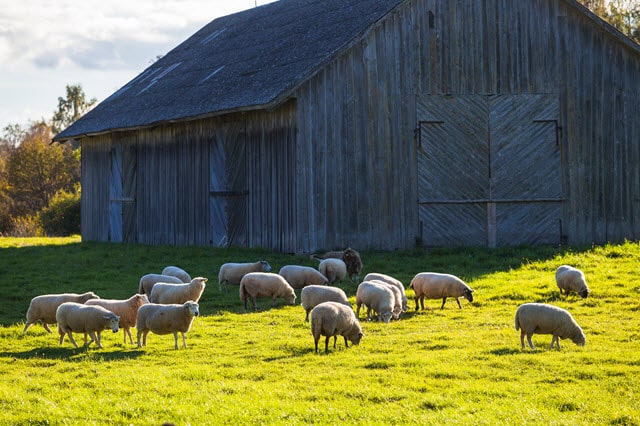
If you go with ewe lambs or even yearlings, you will need to have experience as a shepherd. Have you ever wondered why ewe lambs cost less? It’s because they are a riskier purchase. They haven’t yet proven themselves to be effective members of the flock, and during their first year bearing lambs they could have a number of difficulties which could result in a major loss for your farm.
You cannot know for sure whether a younger ewe will successfully breed. And even if they do, you do not know if they will have problems with delivering or mothering their lambs.
Selecting Brood Ewes from An Established Flock
Purchasing older ewes can be a great way to save money when buying a starter flock. They shouldn’t be too old, however. Sometimes farmers sell off ewes that the shepherd wants to sell in order to maintain a lower overall age of ewes. A slightly older ewe that is still having lambs and doing well with that, as well as being in good health, is a good investment.
Many times shepherds who have especially successful flocks will sell off their slightly older ewes, simply because they don’t have enough space to keep them. You should be aware that if you decide to get slightly older ewes, you will end up having to cull the sheep sooner than if you had gone with younger animals.
However, you will also have the chance to keep the ewe lambs from sheep that are better-than-average ewes.
Be aware that slightly older animals can be prone to illness or disease, and other problems requiring veterinary care, however. Keep this in mind as you calculate all the expenses and make your decisions.
If you have the option, try to get 2-4 year old brood ewes as the foundation of your ewe flock.
Auctions are Never a Place to Buy Breeding Stock
In my opinion, weekly livestock auctions should be avoided for buying sheep breeding stock. Very often, the animals sold there are non-productive or market animals. It’s true that you might sometimes get lucky and find a good animal, but you probably will not.
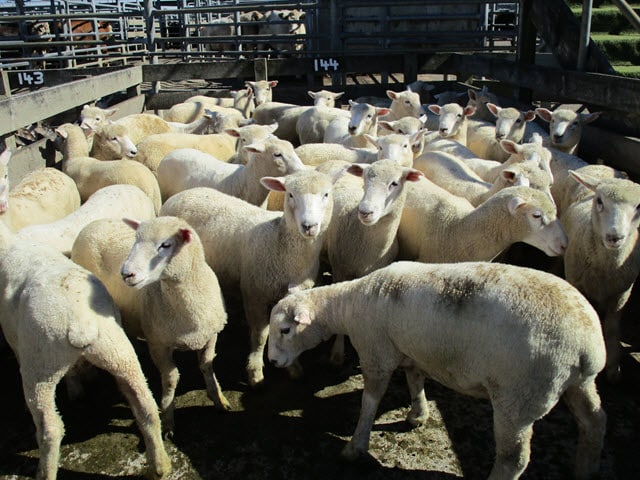
On most occasions, you will end up with another farmer’s problem.
Don’t fall for the low prices of weekly auctions. If you try to save too much money at this point of your operation, you are likely to pay more down the road.
Sometimes Breeding Stock Will Cost More
There are certain times of year when you will have to pay higher prices for breeding stock. A ewe that is pregnant and nearly ready to lamb will cost more. However, ewes that are “open” (not bred) will be cheaper. These sheep may have just weaned lambs and they’ll be ready to breed again in the fall.
The cost of sheep will also vary by what kind of sheep you buy.
Stock from top show flocks, and sheep from rare breeds may also cost more. Instead of going with an unusual or rare breed at first, take a look at what sheep are raised in your area. Consider choosing a breed of sheep that is easy to find locally, and a breed that a few nearby farmers raise.
This gives you access to diverse bloodlines locally, and the ability to have a choice in the selection process (rather than buying everything from a single farm).
Do Local Research
It’s well worth your time to do extensive local research on the cost of sheep in your area. Talk to local farmers and people who have experience in the business. Don’t be shy about asking questions – the price of sheep in your area may differ from the experiences I’m relating in this article, and if you don’t ask you won’t know.
When you go to buy sheep, always have a respectful attitude and be honest. Farmers will appreciate your sense of fair play and they will be more likely to open up with you about the opportunities, and share advice to help you get started.
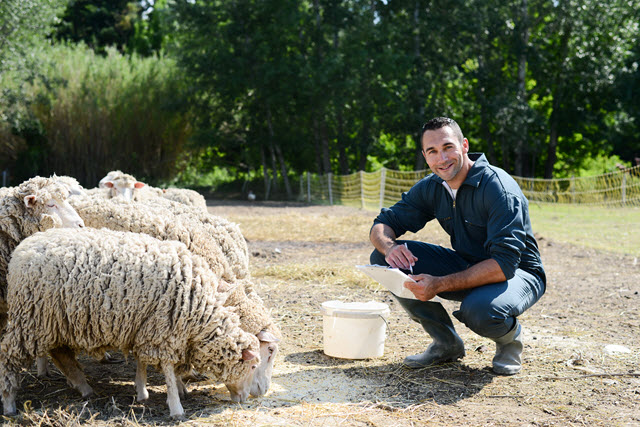
Tell them that you are new to sheep herding and show that you are grateful for the information they can give you.
You will find that most sheep farmers are friendly and eager to share information about what they do.
Most will treat you well in the hopes that you’ll become part of their community for years to come.
Remember to Examine the Sheep
Ask the farmer to give you the chance to see the sheep you are thinking about buying in a pen separate from the other animals in the flock. You should go into this pen and spend time touching and examining the sheep.
If you’re buying a wool breed examine the wool for consistency and the qualities you value.
If you’re raising sheep for meat, get your hands on the animal and feel the length of loin, the muscling, and the structure of their body.
Be wary of animals that have prominent rib cages. When you find this is the case, also check their hips and backbone. If you find that these bones are protruding, the sheep are suffering from severe malnourishment, or they may have a heavy parasite load.
There could also be other health problems, such as ovine progressive pneumonia, or the animal may no longer has teeth (or have a poor bite that prevents it from grazing well.
More Considerations
Never buy a sheep if you have any doubts about its health. This is especially true of breeding stock.
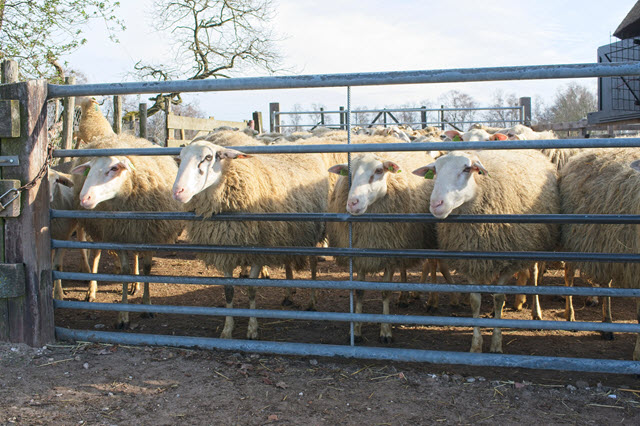
If you’re buying a brood ewe check the sheep’s udder. To do this, you can either feel beneath the sheep or flip the ewe to get a clear view. Make sure there is no graininess, lumpiness, or hard spots, and the teats appear normal. If you find any issues, it’s best not to buy this sheep.
When buying a ram you should carefully inspect the ram’s scrotum and testicles to ensure there are no abnormalities that you can feel. It may sound strange, but if you’re buying a stud ram you need to make sure he can do his job on your farm.
Don’t Rush In
The biggest piece of advice I can offer is that when you decide you’d like to start raising sheep, don’t make a purchase of the first lamb you see.
You have options, and by giving yourself the time you need to consider the breed of sheep you’ll raise, and how you want to get started with your farm, you will make a better decision and set yourself up for success.
How much do sheep cost? It depends on a number of factors. But if you rush in and make a hasty decision, the price you pay will certainly be higher than you hoped.

